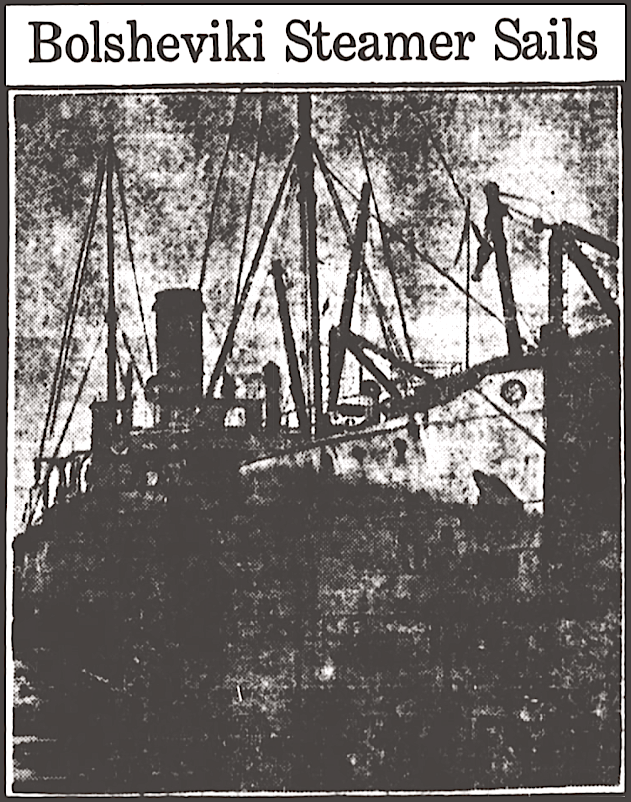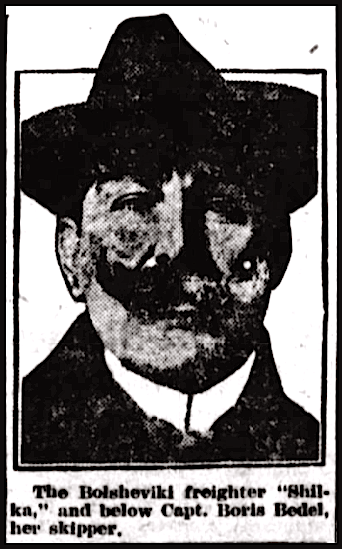I have no country to fight for
My country is the earth
And I am a citizen of the world.
-Eugene Victor Debs
Hellraisers Journal: Thursday January 10, 1918
Seattle, Washington – The Shilka Sets Sail to Cheers of Supporters
From The Tacoma Times of January 9, 1918:
—–
(Special to the times.)
SEATTLE, Jan. 9.-Serenaded by a volunteer brass band playing “The Marseillaise” and “The Star Spangled Banner,” cheered by more than a hundred admirers and friends, the Russian steamship Shilka, which had return from Tacoma on Monday morning with her bunkers full of coal, bade farewell to Seattle at Pier 5 at 2 o’clock Tuesday afternoon when she sailed for Kobe via Yokohama.
———-
SOURCE & IMAGES
The Tacoma Times
(Tacoma, Washington)
-Jan 9, 1918
https://www.newspapers.com/image/68037426/
See also:
For more on the Shilka in Seattle:
Revolution in Seattle: A Memoir
-by Harvey O’Connor
Haymarket Books, 2009
(search: shilka)
https://books.google.com/books?id=ayj5zs40WtoC
Stories floated back from Nome [to Seattle] from Nome on the first boat out in the spring that contact had been established between the Nome miners and the Bolsheviks from across the narrow strait-certainly an historic event if it ever took place. One story told of a Nome miner who had made his way over the ice to greet the Russians. On his return he was jailed. Another reported that the miners’ union considered declaring a Soviet in Nome. Cooler heads argued that when the ice broke up the federals would come in and round up the entire camp.
But the Bolshevik revolution sailed right into Elliott Bay around Christmas of 1917, in the persons of 63 sailors on the good ship “Shilka.” Its arrival was a nine-day wonder not only in Seattle but throughout the nation. The business press went to work on the “Shilka”-it carried $100,000 in gold for the I.W.W., its hold concealed munitions for starting a Bolshevik revolution in America, its crew hid bombs in their pockets.
The prosaic fact was that the “Shilka” carried nothing more explosive than a cargo of licorice root, peas, and beans, its crew members were unarmed, and the captain, contrary to rumors that the crew had mutinied, was still in command. To be sure the sailors after leaving Vladivostok had declared a “soviet” aboard-a strange term which translated into nothing more menacing than “council”-and had decreed a six-hour day, and the skipper, Captain Boris Budelov, whether willingly or not, had acceded to his new status as a “comrade” who took orders from the ship’s council on matters aside from navigation. “All of us are Bolsheviki,” the mate explained to the Industrial Worker, in a lengthy interview. Sailors had been divided into three grades; now, he said, there were only first-class sailors aboard.
The federals surrounded the “Shilka” at her berth, arrested Captain Budelov and held the crew incommunicado for several days until the Central Labor Council (AFL) was able to lift the iron curtain and to express to the captain “fraternal greetings of organized labor in Seattle for the organized workers of Russia in their struggle for industrial and political democracy.” Then the “Shilka’s” crew proudly paraded from the dock to the Wobbly hall where they got a rousing reception upon announcing that they had elected a committee of five to run the vessel’s internal economy. But when Seattle Russians pressed around the ship to greet their fellow-country men, the federals arrested 27 of them, many of whom were held for deportation.
The “Shilka” left harbor on January 8, 1918, with its band on the foredeck playing the “Marseillaise,” and hundreds of local well-wishers waving it bon voyage. To many dock workers the presence of a band on a tramp ship was also a wonder-who had ever heard of bands on cargo boats?
[Paragraph breaks added.]
Harvey provides the following sources in notes for Chapter 4:
-The Seattle Union Record of Dec 29, 1917 and Jan 9, 1918 for the “Shilka Incident”
-& also the [New York?] Call of December 24 1917 and Jan 9, 1918.
-The Industrial Worker of Dec 29, 1917 and Jan 12, 1918 for an interview with the crew of the Shilka.
Re letters from Seattle workers carried back to Russia by the Shilka:
History of the Labor Movement in the United States: Postwar Struggles, 1918-1920
-by Philip S. Foner
International Publishers Co, 1987
(search: shilka)
https://books.google.com/books?id=UMBWNCXcR8wC
When the Shilka left Seattle harbor on January 8, 1918 it carried a letter from the Central Labor Council to the workers of Russia. Entitled “To the Workers of All Russia, Who are Sincerely Endeavoring to Establish Democracy, in Care of the Crew of the Russian Steamship Shilka,” The letter contained fraternal greetings in the name of more than 40,000 organized workers of Seattle who were also “an integral part of the American Federation of Labor, whose membership is composed of 2,000,000 men and women.” The Central Labor Union wished the Russian workers success in “your efforts to make of Russia a free republic conditioned upon both political and industrial democracy.”
[…..]
The Shilka…also carried a more emphatic message sent by the Tacoma IWW. The Tacoma Wobblies wrote of themselves as “co-workers in our attempt to establish the world wide Industrial Commonwealth…” The message continued:
You no doubt realize that we, the revolutionists of America, being still in the minority, are unable as yet to follow your example in freeing ourselves from the terrible slave system in which we are enthralled, but confidently look forward to the time when we can reach across the Pacific Ocean and grasp the hands of our Progressive Fellow workers in Russia and say WE ARE WITH YOU.
Art Shields on letter sent to Russia on the Shilka and answered by Lenin:
On the Battle-Lines, 1919-1939
-by Art Shields
(search: shilka)
International Publishers, 1986
https://books.google.com/books?id=nPoqAAAAMAAJ
I spent most of the spring and summer of 1921 in Chicago as editor of Industrial Solidarity, the IWW weekly. I had been given the job by Roy Brown, the national chairman. Roy was a lumberjack. His face was scarred from rough and tumble battles with scabs. We had met in Seattle during the general strike. I didn’t know then that Roy had written a letter to Lenin, which brought a classic reply. Roy’s letter described the wartime persecution of U. S. workers. It left Seattle in January 1918 on the Shilka, the first Soviet ship to visit the USA. It was answered by Lenin in his famous Letter to American Workers.
August 20 1918: Letter to American Workers by V. I. Lenin:
https://www.marxists.org/archive/lenin/works/1918/aug/20.htm
La Marseillaise
Star Spangled Banner


